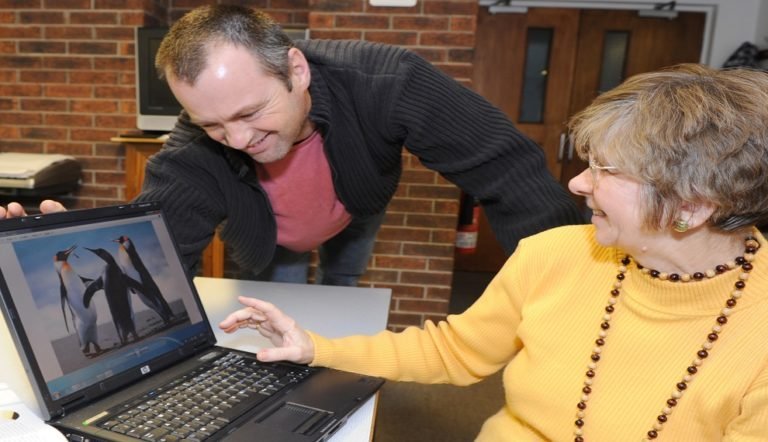Digital support for people with a learning disability at Aneurin Bevan University Health Board
Melanie Vale, ABUHB's Professional Head Occupational Therapist for learning disabilities, writes about the ongoing effort with DCW to tackle inclusion barriers

I’m an occupational therapist working in Aneurin Bevan University Health Board with adults who have a learning disability. For Learning Disability Week, I wanted to share how Digital Communities Wales have supported us during the Coronavirus pandemic to develop our skills and knowledge of digital inclusion, and how we have used the equipment they provided to support the individuals we work with.
Occupational therapists help people overcome challenges to doing everyday activities, or ‘occupations’. Much of this work is done with people in their own homes or places they go to everyday, like day centres, work, or the local community. When the pandemic struck and we went into lockdown, everything changed. Instead of face-to-face visits, we offered phone calls and video consultations as a first option to reduce the risk of passing on Covid. Day services closed to protect those who are vulnerable, and restrictions around care homes meant that many people with a learning disability were stopped from doing their normal activities to a greater extent or for a longer time than people without a learning disability.
We already know that people with a learning disability have worse physical and mental health than the general population. They are more likely to die prematurely, and due to difficulties accessing quality healthcare these deaths are often avoidable. Barriers in accessing healthcare can include poor understanding of learning disabilities and a lack of adjustments to make care accessible. We were concerned that the pandemic restrictions might add to these barriers. Many supported living homes did not have a reliable internet connection at the start of the pandemic and lots of people lacked access to a computer or tablet to get online. Some of the people we support lacked skills in using technology because other people were worried about their online safety or that they might break the equipment.
As an occupational therapy team we worked together to plan how we could overcome these barriers. Part of our role is to promote daily living skills and independence as well as inclusion. For most of us during Covid our socialising banking, shopping, and healthcare all relied on technology of some sort. It was at this point that we came across the concept of Digital Inclusion, which brought us into contact with Digital Communities Wales. At first, we looked at some of the Covid resources and Padlets to help the people we support to stay in touch with others and find alternative activities to do. Digital Communities Wales worked with us to understand our needs and offered occupational therapy staff training in accessibility and smart speakers, staying connected and keeping active online, so that we could support others to do the same.
As the pandemic continued, it was evident that technology would have a continued role in healthcare delivery, and while barriers remained, some people we support preferred seeing healthcare professionals online as it helped reduce difficulties with transport, or saved time. It was at this point that Digital Communities Wales told us about the digital inclusion project and we put in a successful bid for laptops and tablets that would help the people we support to access virtual groups, to connect with people and to build independence skills. We also hoped to be able to use the equipment to support individuals, carers, and staff teams to access training.
The digital inclusion equipment has helped people staying on our inpatient ward to plan activities, to connect with family and friends and attend meetings by video link. We have been able to offer a virtual ‘Recovery through Activity’ group, knowing that we can offer to loan equipment to individuals who need this. We are starting to support people with a learning disability to develop confidence in using the technology to meet their health needs, for example, using apps to plan daily schedules and organise their time. Digital Communities Wales are offering more training to the ABUHB learning disability service this month, in online safety, helping people to get online and sensory apps.
While Covid has presented many challenges to us, and at the start of the pandemic seemed to heighten the barriers people with a learning disability face in accessing digital technology, it has also been an opportunity for us to examine our practice and change the way we do things with the support of Digital Communities Wales. Going forward as a team we are better informed, have some new skills and the right tools to support people with a learning disability to be more digitally included.
Melanie Vale, Professional Head Occupational Therapist for Learning Disabilities, ABUHB

"Digital Communities Wales worked with us to understand our needs and offered occupational therapy staff training in accessibility and smart speakers, staying connected and keeping active online, so that we could support others to do the same."
Melanie Vale, Professional Head Occupational Therapist for Learning Disabilities, ABUHB

